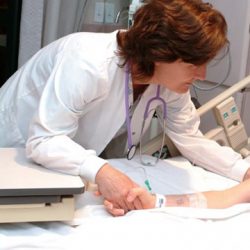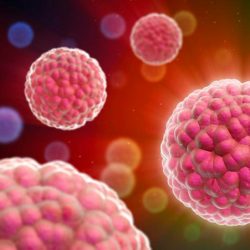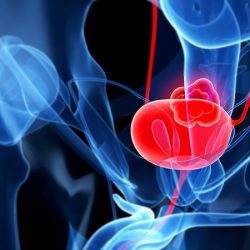A new study shows that patients with human papillomavirus (HPV) -- the same virus associated with both cervical and head and neck cancer -- positive oropharyngeal cancer see significantly higher rates of complete response on a post-radiation neck dissection than those with HPV-negative oropharyngeal cancer. Fox Chase Cancer Center researchers presented the findings at the … [Read more...]
Cancer News

Herbal remedy causes upper urinary tract cancers: A Stony Brook University Study
Genomic sequencing experts at Johns Hopkins partnered with pharmacologists at Stony Brook University to reveal a striking mutational signature of upper urinary tract cancers caused by aristolochic acid, a plant compound contained in herbal remedies used for thousands of years to treat a variety of ailments such as arthritis, gout and inflammation. Their discovery is described … [Read more...]
Gene expression, immune system linked with cancer survival rates: Stanford University Study
Physicians have long sought a way to accurately predict cancer patients' survival outcomes by looking at biological details of the specific cancers they have. But despite concerted efforts, no such clinical crystal ball exists for the majority of cancers. Now, researchers at the Stanford University School of Medicine have compiled a database that integrates gene expression … [Read more...]
‘Pill on a string’ could help spot early signs of esophageal cancer : University of Cambridge Study
A 'pill on a string' developed by researchers at the University of Cambridge could help doctors detect esophageal cancer -- cancer of the gullet -- at an early stage, helping them overcome the problem of wide variation between biopsies, suggests research published today in the journal Nature Genetics. The 'Cytosponge' sits within a pill which, when swallowed, dissolves to … [Read more...]
State regulations linked to late cancer diagnoses: Georgia State University & University of North Carolina Study
States' regulations of health insurance and practitioners significantly influence when patients receive colorectal or breast cancer diagnoses, especially among people younger than the Medicare-eligible age of 65, according to a new study by researchers at Georgia State University's School of Public Health and the University of North Carolina at Chapel Hill. The study … [Read more...]
New hope in the fight against cancer: University of California Study
UCLA scientists have for the first time identified a new sodium-dependent mechanism to deliver glucose -- the body's main fuel that drives tumor growth -- to pancreatic and prostate cancer cells, offering new hope in the fight against two of the deadliest forms of the disease. The study findings further provide the first promising evidence that current sodium-based drug … [Read more...]
Pain intensity can predict head and neck cancer survival: A Study
Pre-treatment pain intensity is an independent survival predictor for patients with head and neck cancer, according to new research published in The Journal of Pain, the peer-reviewed publication of the American Pain Society. Researchers at M.D. Anderson Cancer Center assessed the extent to which pain severity influences survival in 2,340 newly diagnosed patients with head … [Read more...]
New discovery in head and neck cancer therapies: University of California Study
UCLA scientists have discovered for the first time that a protein usually linked to rare neurological disorders is also associated with human papilloma virus (HPV) positive head and neck cancers. The protein was also shown to help improve the effectiveness of chemotherapy treatments, laying the groundwork for the development of more specialized therapies. Head and neck … [Read more...]
Aggressive prostate cancer in African Americans: A Thomas Jefferson University Study
African American men are more likely to develop prostate cancer than European American men, and are also more than twice as likely to die from it. Although there are many reasons that contribute to this health disparity, new research shows that African American men may have a distinctly different type of prostate cancer than European American men, according to new genomic … [Read more...]
One-third of colorectal cancers diagnosed before 35 are hereditary: University of Texas Study
Hereditary colorectal cancers, caused by inherited gene mutations, are relatively rare for most patients. However, researchers at The University of Texas MD Anderson Cancer Center have discovered a particularly high prevalence of hereditary cancers among those diagnosed with the disease before the age of 35. They suggest that these patients should undergo genetic counseling to … [Read more...]
Yoga can lower fatigue, inflammation in breast cancer survivors: An Ohio State University Study
Practicing yoga for as little as three months can reduce fatigue and lower inflammation in breast cancer survivors, according to new research. The more the women in the study practiced yoga, the better their results. At the six-month point of the study -- three months after the formal yoga practice had ended -- results showed that on average, fatigue was 57 percent lower in … [Read more...]
Discovery of new code makes reprogramming of cancer cells possible
Cancer researchers dream of the day they can force tumor cells to morph back to the normal cells they once were. Now, researchers on Mayo Clinic's Florida campus have discovered a way to potentially reprogram cancer cells back to normalcy. The finding, published in Nature Cell Biology, represents "an unexpected new biology that provides the code, the software for turning … [Read more...]
High-dose Vitamin C benefits ovarian cancer patients: University of Kansas Study
Scientists at the University of Kansas Medical Center have determined that high doses of vitamin C, administered intravenously with traditional chemotherapy, helped kill cancer cells while reducing the toxic effects of chemotherapy for some cancer patients. By evaluating the therapy in cells, animals, and humans, the researchers found that a combination of infused vitamin C … [Read more...]
Grandmother’s diet link to risk of colon cancer: Utah State University Study
Will a multi-generational exposure to a western type diet increase offspring's chance of developing colon cancer? Will cancer-fighting agents, like green tea, help combat that increased risk? Those are the two questions Abby Benninghoff, an assistant professor in Utah State University's College of Agriculture and Applied Sciences, will attempt to answer thanks to a $500,000 … [Read more...]
Coupling head and neck cancer screening, lung cancer scans could improve survival: University of Pittsburgh Study
Adding head and neck cancer screenings to recommended lung cancer screenings would likely improve early detection and survival, according to a multidisciplinary team led by scientists affiliated with the University of Pittsburgh Cancer Institute (UPCI), a partner with UPMC CancerCenter. In an analysis published in the journal Cancer and funded by the National Institutes of … [Read more...]
Chemotherapy after bladder cancer surgery may improve survival: A Study
Patients that received chemotherapy after bladder cancer surgery demonstrated an approximately 30% lower risk of death than those that underwent surgery alone, according to an analysis to be presented by researchers at the Icahn School of Medicine at Mount Sinai at the 2015 Genitourinary Cancers Symposium. Clinical trials have established the benefit of giving chemotherapy … [Read more...]
Common chemicals may act together to increase cancer risk: Oregon State University Study
Common environmental chemicals assumed to be safe at low doses may act separately or together to disrupt human tissues in ways that eventually lead to cancer, according to a task force of nearly 200 scientists from 28 countries, including one from Oregon State University. In a nearly three-year investigation of the state of knowledge about environmentally influenced cancers, … [Read more...]
Diabetes drug pioglitazone and risk of bladder cancer: A Study
Although some previous studies have suggested an increased risk of bladder cancer with use of the diabetes drug pioglitazone, analyses that included nearly 200,000 patients found no statistically significant increased risk, however a small increased risk could not be excluded, according to a study in the July 21 issue of JAMA. Assiamira Ferrara, M.D., Ph.D., of Kaiser … [Read more...]
Sound waves gently cull circulating tumor cells from blood samples of cancer patients: A Pennsylvania State University Study
The capture and analysis of circulating tumor cells (CTCs) in the blood of cancer patients is a valuable tool for treatment decisions and therapy monitoring. Until recently, it was a huge challenge to capture these rare cells in a blood sample. In a new approach, researchers funded by the National Institute of Biomedical Imaging and Bioengineering have developed a system that … [Read more...]
Applying New Jersey population traits to Louisiana reverses colorectal cancer trends: American Cancer Society Study
If Louisiana, which has some of the highest colon cancer incidence and mortality rates in the nation, had the same risk factors, screening uptake, and survival rates as New Jersey, incidence and mortality from the disease would not only drop, they would drop to levels below that of New Jersey, according to a new study. The study, appearing in Cancer, shows that removing … [Read more...]
Targeting bacteria causing ulcers may prevent stomach cancer: A McMaster University Study
A research review for the Cochrane Library, led by McMaster University researchers, has found that eliminating Helicobacter pylori bacterium -- the main cause of stomach ulcers -- with a short course of therapy of two commonly used medicines may help to reduce the risk of gastric cancer. Stomach, or gastric, cancer is the third most common cause of death from cancer … [Read more...]
Drinking coffee daily may improve survival in colon cancer patients
Regular consumption of caffeinated coffee may help prevent the return of colon cancer after treatment and improve the chances of a cure, according to a new, large study from Dana-Farber Cancer Institute that reported this striking association for the first time. The patients, all of them treated with surgery and chemotherapy for stage III colon cancer, had the greatest … [Read more...]
SBRT for Pancreatic Cancer
Stereotactic body radiation, or SBRT, is a radiation therapy designed to treat tumors and protect healthy tissue at the same time. It’s been used successfully in patients with lung, brain and spinal cord tumors. But now, researchers say SBRT may also help some patients with pancreatic cancer, traditionally one of the deadliest and most difficult cancers to treat. Lorri and … [Read more...]
Complex head and neck tumor behavior: A study
Head and neck squamous cell cancer (HNSCC) ranks among the top ten most prevalent cancers in the United States. Despite its prevalence, little is known about how this cancer develops and spreads. However, in a paper published in the January 29, 2015 edition of Nature, researchers offer critical new information about head and neck cancers. An increasing number of head and … [Read more...]
‘Cancer Driver Gene’ reduces metastasis in prostate cancer: Medical University of Vienna Study
A gene that is responsible for cancer growth plays a totally unexpected role in prostate cancer. The gene Stat3 is controlled by the immune modulator interleukin 6 and normally supports the growth of cancer cells. The international research team led by Prof. Lukas Kenner from the Medical University of Vienna, the Veterinary University of Vienna, and the Ludwig Boltzmann … [Read more...]
Poor survival in multiple myeloma patients linked to genetic variation: University of Utah Study
As part of a multi-institutional effort, researchers with Huntsman Cancer Institute at the University of Utah have found that multiple myeloma patients with a genetic variation in the gene FOPNL die on average 1-3 years sooner than patients without it. The finding was identified with a genetic mapping technique, genome wide association studies (GWAS), and verified in patient … [Read more...]
Important molecule in ovarian cancer found: A Study
Scientists at Lawson Health Research Institute have uncovered an important new target for ovarian cancer therapy. Contrary to current research this new study found that LKB1, a molecule that regulates the metabolism of many adult cells, is an important molecule in the cancer's promotion and survival. Thousands of women are living with ovarian cancer in Canada. It is … [Read more...]
Leading experts prescribe how to make cancer drugs more affordable: A Study
A group of 118 of the nation's leading cancer experts have drafted a prescription for reducing the high cost of cancer drugs and voiced support for a patient-based grassroots movement demanding action on the issue. Their recommendations and support are outlined in a commentary, co-authored by the group, in the journal Mayo Clinic Proceedings. "High cancer drug prices are … [Read more...]
New radiotracer helps avoid neck dissection in patients with early head and neck cancer: A Study
A new tracer can enable surgeons to make an accurate identification of the sentinel node -- the lymph node to which cancer spreads first -- and hence spare patients the post-operative complications that may be linked to the removal of a group of lymph nodes in the neck. The discovery that the identification and biopsy of the first lymph node to which a cancer spreads (the … [Read more...]
New clinical guidelines for cancer-related fatigue
Fatigue is a debilitating problem for cancer patients undergoing treatment; however, it also poses a huge detriment after treatment and can significantly affect quality of life. Approximately 30 percent of cancer patients endure persistent fatigue for several years after treatment, according to an American Society of Clinical Oncology Expert Panel co-chaired by Paul Jacobsen, … [Read more...]
- « Previous Page
- 1
- …
- 7
- 8
- 9
- 10
- 11
- …
- 37
- Next Page »

























